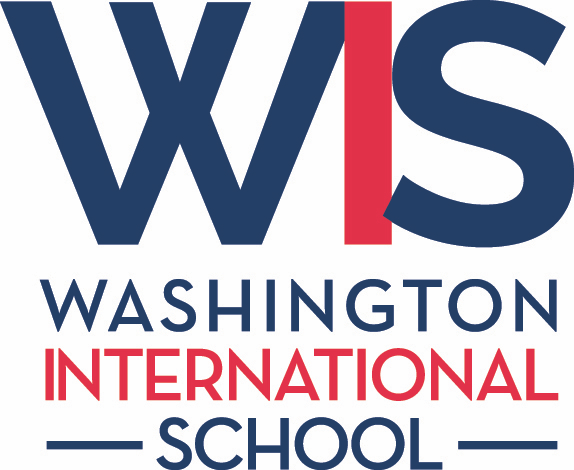DCPZEC (DCPZ Early Childhood) is Back!
This blog post is written by Alexandra Morris, Early Childhood Special Education Coordinator at George Mason University, and Kerstin Schmidt, Pre-K teacher at Briya Public Charter School in DC.
DC-Project Zero Early Childhood (DCPZEC), an affiliate group of DCPZ, began meeting about five years ago, inspired by the WISSIT throughlines of finding ways to enact Project Zero ideas in our classrooms and learning contexts, as well as a means to continue to exchange ideas beyond the institute. More specifically, the group formed as a way for early childhood educators to collectively and collaboratively grapple with what PZ means for us working with the youngest learners. In early childhood classrooms, sometimes implementing PZ is less obvious, especially if we get caught up with closely associating PZ with using thinking routines. Yet, at the same time, a lot of PZ feels familiar to early childhood educators; it’s informed by constructivist, developmentalist, child-centered pedagogy and shares roots in play-based, maker-centered, and Reggio-inspired practices.
Over the years, we have developed our own set of throughlines to guide our work together:
- What are we already routinely doing in our classrooms to generate and extend children’s thinking?
- What sorts of thinking do we want to become routine in our classrooms and in our interactions with children?
- What routines do we want to establish and sustain as teachers to support thinking?
- Can we invent some of our own thinking routines as well as adapting existing PZ thinking routines?
- What routines can we build in our DCPZEC group that will support us in our ongoing work?
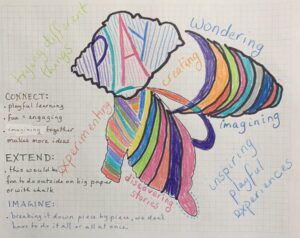
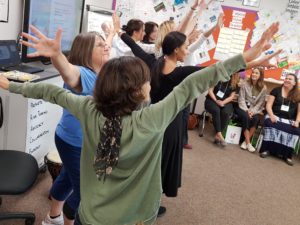
At its heart, the DCPZEC group is about creating a hands-on, interactive, and playful space for us as adult learners to reflect on what PZ looks like in action. This community serves as a way for us as early childhood teachers to provoke our own thinking, deepen our understanding, and transform inspiration into practice. We play with ideas. Using thinking routines and protocols, we take them apart and tinker with them. Often, things get really messy! The communal and collaborative nature of the group empowers us to take risks and explore new pathways–to be brave and try out new ideas in our classrooms that center thinking as the essence of the curriculum.
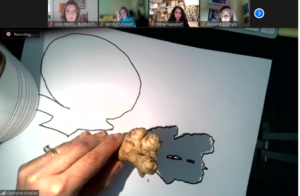
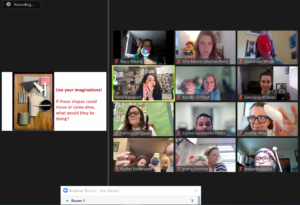
After taking a pandemic-induced hibernation, DCPZEC relaunched virtually in January with a playful workshop led by Dena Rapoport, an educator at the National Gallery of Art, and Georgina Ardalan, a PreK-3 teacher at J.O. Wilson Elementary School (DCPS). Adapting a session developed for the National Gallery of Art’s Family Programs, Georgina and Dena shared a hands-on, exploratory experience transforming ordinary objects into extraordinary works of shadow art. From their own zoom boxes, participants created shadows using flashlights and found objects, which required a little coordination and experimentation. “Something interesting that I notice with shadows is when you move the same object in a different direction, it is going to turn in a different way,” noticed one participant. “Yes!” Agreed another. “I was adding the new lines on top of the old ones when the light changed.”
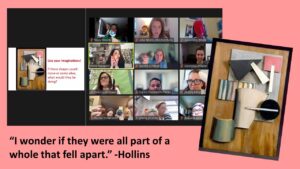

After the playful art experience, Dena and Georgina led a reflection using Connect-Extend-Imagine (an adaptation of the thinking routine Connect-Extend-Challenge), followed by a Micro Lab in smaller groups to allow participants the opportunity to build connections to their practice and imagine ways to bring the experience of the workshop into their classroom settings. Participants shared amazing connections and ideas–from explorations of shadows with chalk during playground time, to the power of using black and white in creating art, to connections with music and movement.
The DCPZEC group plans to continue to meet about once a month during the school year. Our next meeting is scheduled for Thursday, March 3, 6:30-8:00pm ET. For this session, called Holding Space for Reimagining, we will utilize an “unconference” format, in which participants will generate the discussion topics together, as a way to harness the collective power of the group to reimagine teaching and learning in our classrooms. The pandemic has brought about many changes–how can we use the shake-up as an opportunity to rethink and realign our values? Look for more information and an invitation soon.
While the DC-PZ-EC group is perhaps most relevant to educators working with young children from birth to age eight, all are welcome to participate, including administrators and teachers working with older grades. Much of the group’s work naturally incorporates play and playful learning, so anyone curious to explore those connections to their curriculum is welcome as well. If you have questions, comments, or would like to join our mailing list (or if you thought you were on our mailing list but did not receive emails in January), please contact [email protected]. You can also follow us on Twitter @DCPZEC!


